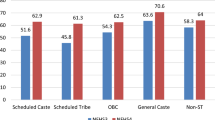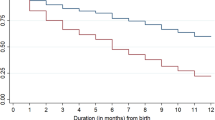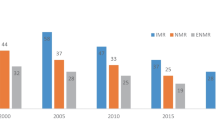Abstract
Despite improvements in public health in recent decades, levels of infant and child mortality remain unacceptably high, particularly in developing countries where primary healthcare services including prenatal care services are not universally available. Using information on 7,001 childbirths in five years preceding the 2004 Bangladesh Demographic and Health Survey, this study examined the relationship between receiving prenatal care during pregnancy and infant mortality using multivariate survival analysis. The results are presented in hazard ratios (HR) with 95% confidence intervals (95% CI). Results indicate that children of mothers who did not receive prenatal care during pregnancy were more than twice as likely to die during infancy as children whose mothers received prenatal care during pregnancy (HR=2.40, 95% CI: 1.74, 3.31) independent of child's sex, delivery assistance, birth order; mother's age at child birth, nutritional status, education level; household living conditions, and other factors. Children born to older mothers living in households without safe drinking water were at an increased risk. The study concludes that prenatal care is strongly negatively associated with infant mortality in Bangladesh independent of other risk factors. The results suggest that improving prenatal care services at the community level is key to improving child survival in Bangladesh.

Similar content being viewed by others
References
United Nation Development Programme. Human Development Report 2004. New York (NY):UNDP 2004.
World Bank. World Development Report 2000. Washington (DC): World Bank 2000.
Bryce J, Black RE, Walker N, Bhutta ZA, Lawn JE, Steketee RW. Can the world afford to save the lives of 6 million children each year? Lancet 2005;365:2193–200.
Atiyeh GN, El-Mohandes A. Preventive healthcare of infants in a region of Lebanon: parental beliefs, attitudes and behaviors. Matern Child Health J 2005;9:83–90.
Yucesoy G, Ozkan S, Bodur H, Tan T, Caliskan E, Vural B, Corakci A. Maternal and perinatal outcome in pregnancies complicated with hypertensive disorder of pregnancy: a seven year experience of a tertiary care center. Arch Gynecol Obstet 2005;273:43–49.
Ravikumara M, Bhat BV. Early neonatal mortality in an intramural birth cohort at a tertiary care hospital. Indian J Pediatr 1996;63:785–9.
Rajaram P. Child survival: maternal factors. Indian J Matern Child Health 1990;1:39–45.
Sharp BA, Meikle SF, James MD, Steiner C, Remus D. NHQR/NHDR measures for women of reproductive age. Med Care 2005;43(Suppl): I64–71.
Mathai M. Improving maternal and child survival in India. Indian J Med Res 2005;121:624–7.
Darmstadt GL, Bhutta ZA, Cousens S, Adam T, Walker N, de Bernis L. Evidence-based, cost-effective interventions: how many newborn babies can we save? Lancet 2005;365: 977–88.
Barros FC, Victora CG, Barros AJ, Santos IS, Albernaz E, Matijasevich A, Domingues MR, Sclowitz IK, Hallal PC, Silveira MF, Vaughan JP. The challenge of reducing neonatal mortality in middle-income countries: findings from three Brazilian birth cohorts in 1982, 1993, and 2004. Lancet 2005;365:847–54.
Yasmin S, Osrin D, Paul E, Costello A. Neonatal mortality of low-birth-weight infants in Bangladesh. Bull World Health Organ 2001;79(7):608–14.
United States Agency for International Development. Improving family health: Bangladesh. Retrived 5/9/2006 from http://www.usaid.gov/ locations/asia_near_east/countries/bangladesh/bangladesh.html
Engender Health. Country by Country: Bangladesh. Retrieved 5/8/2006 fom http://www.engenderhealth.org/ia/cbc/ bangladesh.html
World Health Organization, Regional Office of South-East Asia. Country health profiles: Health profile of Bangladesh. Retrieved 12/15/2005 from http://www.whoban.org/country_health_ profile.html.
Adam T, Lim SS, Metha S, Bhutta ZA, Fogstad H, Zupan J, Darmstandt GL. Cost effectiveness analysis of strategies for maternal and neonatal health in developing countries. BMJ, 2005, 331(7525):1107.
Perry HB, Shanklin DS, Schroeder DG. Impact of a community-based comprehensive primary healthcare programme on infant and child mortality in Bolivia. J Health Popul Nutr 2003;21:383–95.
Irudaya Rajan S, Navaneetham K. Maternal and child immunization on infant survival in Kerala, India. Janasamkhya 1994;12:159–82.
Dummer TJ, Parker L. Changing socioeconomic inequality in infant mortality in Columbia. Arch Dis Child. 2005;90(2):157–62.
Van De Mheen H, Reijneveld SA, Mackenbach JP. Socioeconomic inequalities in perinatal and infant mortality from 1854 to 1990 in Amsterdam, the Netherlands. Eur J Public Health 1996; 6(3):166–74.
Kiros GE, Hogan DP. War, famine and excess child mortality in Africa: the role of parental education. Inter J Epidemiol 2001;30:447–55.
Cutts FT, Dos Santos C, Novoa A, David P, Macassa G, Soares AC. Child and maternal mortality during a period of conflict in Beira City, Mozambique. Inter J Epidemiol 1996;25:349–56.
Choe MK, Luther NY, Pandey A, Sahu D, Chand J. Identifying children with high mortality risk. National Family Health Surveillance Bull 1999;12:1–4.
National Institute of Population Research and Training, Mitra and Associates, ORC Macro. The Bangladesh Demographic and Health Survey 2004. National Institute of Population Research and Training; Mitra and Associates; ORC Macro, Dhaka, Bangladesh; Calverton, Maryland, 2005.
Rutstein SO, Rojas G. Guide to DHS statistics. ORC Macro, Calverton, Maryland, 2003.
Berkman LK, Kawachi I. Social Epidemiology. Oxford University Press, New York: 2000.
Stata Corporation, Inc. STATA Release 8.1. College Station (TX): Stata Press 2003.
Feresu SA, Harlow SD, Welch K, Gillespie BW. Incidence of stillbirth and perinatal mortality and their associated factors among women delivering at Harare Maternity Hospital, Zimbabwe: a cross-sectional retrospective analysis. BMC Pregnancy Childbirth 2005;5:9.
Bawa SB, Umar US, Onadeko M. Utilization of obstetric care services in a rural community in southwestern Nigeria. Afr J Med Med Sci 2004;33:239–44.
Humphrey MD, Keating SM. Lack of antenatal care in far north Queensland. Aust N Z J Obstet Gynaecol 2004;44:10–3.
Escobar GJ, Littenberg B, Petitti DB. Outcome among surviving very low birth-weight infants: a meta-analysis. Arch Dis of Child 1991;66:204–11.
Eshleman MJ, Poole V, Davidhizar R. An investigation of factors associated with infant mortality in two Midwest counties. J Pract Nurs 2005;55:5–10.
Cruz-Anguiano V, Talavera JO, Vazquez L, Antonio A, Castellanos A, Lezana MA, Wacher NH. The importance of quality of care in perinatal mortality: a case-control study in Chiapas, Mexico. Arch Med Res 2004;35:554–62.
Thapar N, Sanderson IR. Diarrhoea in children: an interface between developing and developed countries. Lancet 2004;363:641–53.
Wells JC. Natural selection and sex differences in morbidity and mortality in early life. J Theor Biol 2000;202: 65–76.
Peña R, Wall S, Persson L. The effect of poverty, social inequality, and maternal education on infant mortality in Nicaragua, 1988–1993. Am J Public Health 2000;90:64–9.
Author information
Authors and Affiliations
Corresponding author
Additional information
Informed consent : This study is based on an analysis of existing survey data with all identifier information removed. The survey acquired informed consent from mothers of the children included in this study before asking any questions and before obtaining anthropometric measurements.
Rights and permissions
About this article
Cite this article
Hong, R., Ruiz-Beltran, M. Impact of Prenatal Care on Infant Survival in Bangladesh. Matern Child Health J 11, 199–206 (2007). https://doi.org/10.1007/s10995-006-0147-2
Received:
Accepted:
Published:
Issue Date:
DOI: https://doi.org/10.1007/s10995-006-0147-2




